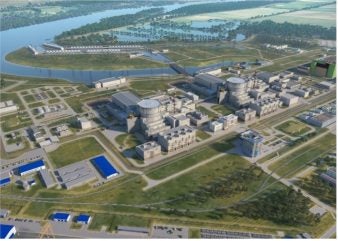
The EU Foreign Affairs Council meeting in Luxemburg approved a 14th package of sanctions against Russia but exempted Hungary’s Paks II NPP from the provisions. Hungary had agreed to the EU’s latest package of sanctions, which provides for restrictions on supplies of liquefied natural gas, in exchange for assurances that no current or future measures will threaten Paks II, which is being built by Rosatom. Previously, the Hungarian government had refused to support any punitive measures affecting the Russian gas sector, citing security of supply.
The Paks II project was launched in 2014 by an inter-governmental agreement between Hungary and Russia for two VVER-1200 reactors (units 5&6) to be supplied by Rosatom. The contract was supported by a Russian state loan to finance the majority of the project. Preparatory site work is underway and key equipment has been delivered to the site.
The Chairman-CEO of Paks II, Gergely Jákli, said the decision is an important signal for EU and Hungarian suppliers. He explained that the project has been given a separate paragraph in the regulation. Previously the project was mentioned as an exception in the EU sanctions Now it is stated in a general, separate paragraph that the sanctions have no impact on the project.
“This is an important step forward, which clearly shows all potential European suppliers that measures taken by the EU will not affect the supply of any given product or service to the Paks II project,” he said. He added that this is particularly important for Hungarian companies, as it is of utmost importance that as much Hungarian expertise and knowledge as possible should be integrated into the 2400 MWe NPP.
He also noted that previously, for certain products and services, an exemption licence had to be requested from the competent authority of a country supplying products or services. In the case of Paks II, this requirement has been dropped, and it will be sufficient to simply inform the authorities. “This will allow companies from the European Union to focus on what is important for a nuclear supplier: the production of key components and quality assurance,” said Jákli. “This is wake-up call for the business community that the investment is waiting for all EU suppliers with the capacity and competence.”
Minister of Foreign Affairs & Trade Peter Szijjártó, who attended the EU Foreign Affairs Council said it was a pleasure to fight for the protection of interests of views and energy security, noting that the Paks enlargement and all its processes are now completely exempt from sanctions. He added that any European companies wishing to invest in the project such as the Germans, the French and the Austrians, they will not have to seek permission even from their own member state authorities. “No EU government can stop European companies from participating in the Paks expansion. This means that we have removed a lot of obstacles and complexity from the system and can speed up investment.”
Meanwhile, Paks II CEO Gergely Jákli led a Paks delegation on a visit to Egypt’s El-Dabaa NPP where he had talks with the Chairman of the Nuclear Power Plants Authority (NPPA) Dr Amjad Al-Wakeel. The main purpose of the visit was to become familiar with the current status of the construction at El Dabaa, which is also being built by Rosatom and which will have four VVER-1200 reactor units. The Paks delegation was accompanied the vice president of Rosatom’s Atomstroyexport and Director of the El-Dabaa project, Alexei Kononenko, and the vice-chairman of the board and general manager for El-Dabaa at the NPPA, engineer Mohamed Ramadan Badawi.
“We are open to opportunities for cooperation with the Paks II NPP team in terms of sharing experience in building a NPP with a VVER-1200 reactor, and we hope to learn from the country, which has been operating nuclear power plants for many decades,” said Badawi.
“The Paks II project is truly international with the participation of the Russian general contractor and a number of leading Western subcontractors,” said Jákli. “For us, the exchange of experience with those countries that operate or are building NPPs with similar VVER technology » is very important.”






